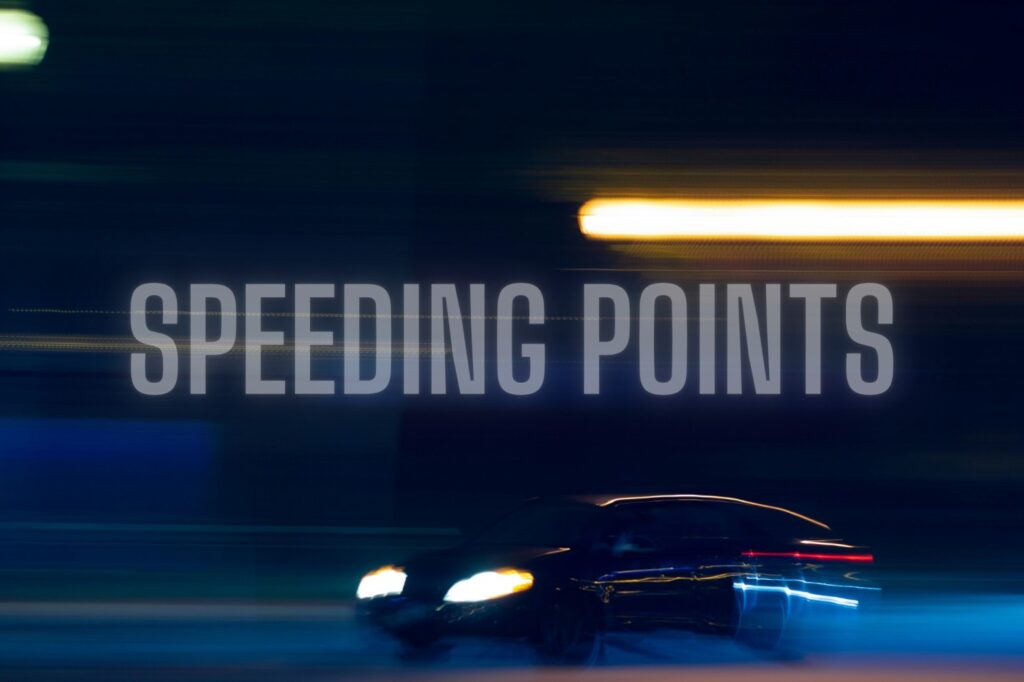Speeding is one of the most common traffic violations worldwide. If you get caught, you might have to pay a fine, get points on your license, or see your insurance rates go up.

You may wonder, “How many points do I get for speeding?” The answer depends on factors like how fast you were going, where you were driving, and your past driving record. This article will explain speeding tickets, the points system, and how they affect drivers.
Contents
What Are License Points?
Many countries use a points system to track and penalize drivers who break traffic laws. Each time a driver commits a violation, points are added to their record. Too many points can lead to mandatory driving classes, a suspended license, or higher insurance costs.
In the U.S., each state has its own system, but speeding usually results in 2 to 6 points. In the U.K., speeding violations typically add 3 to 6 points. Similar systems exist in Canada, Australia, and other countries to discourage reckless driving.
How Many Points for Speeding?
The number of points you receive for speeding depends on the circumstances of the violation. Here’s a breakdown:
- Minor Speeding Violations: If you’re caught driving a little over the speed limit (like 5-10 mph over), you may get fewer points. For example, in California, going 1-15 mph over the limit usually adds 1 point to your license.
- Moderate Speeding Violations: Driving much faster than the speed limit (15-25 mph over) usually leads to more points. For example, in New York, this can add 4 points to your license.
- Excessive Speeding Violations: If you’re caught driving 25+ mph over the limit, the penalties are much stricter. In some states, this can mean 6 points or even an automatic license suspension.
- Reckless Driving: If speeding is considered reckless or puts others in danger, you may face extra penalties, including more points and possible criminal charges.
How Much is a Speeding Fine
- United States: Speeding fines typically range from $20 to $500, depending on the state and how much you exceeded the speed limit. In extreme cases, fines can exceed $1,000.
- United Kingdom: Fines start at £100 (around $130) and can go up to £2,500 (around $3,250) for serious offenses, depending on speed and road type.
- Australia: Fines vary by state and can range from around AUD 200 to over AUD 1,000, depending on the severity of the offense.
Factors That Affect Speeding Points
Several factors can influence how many points you receive for a speeding violation:
- Jurisdiction: Point systems vary by state and country. For example, speeding usually results in 3 points in the U.K., but some U.S. states may assign more.
- Speed Over the Limit: The more you exceed the speed limit, the more points you’re likely to get.
- Driving History: Drivers with a clean record may get fewer points or just a warning, while repeat offenders usually face stricter penalties.
- School or Construction Zones: Speeding in these areas often leads to higher points and fines because of the greater risk to pedestrians and workers.
- Weather Conditions: Speeding in dangerous conditions like heavy rain or snow can result in extra penalties.
What Happens If You Get Too Many Points?
Accumulating points on your license can have serious consequences:
- License Suspension: If you accumulate too many points within a set period, your license may be suspended. In Florida, for example, 12 points in 12 months can result in a 30-day suspension.
- Higher Insurance Premiums: Insurance companies consider your driving history when setting rates. More points on your license can lead to significantly higher premiums.
- Mandatory Driving Courses: In some places, drivers with too many points must attend traffic school or defensive driving courses.
- Employment Impact: If your job involves driving, having too many points on your license could put your employment at risk.
- Criminal Charges: In serious cases, excessive speeding or reckless driving can lead to criminal charges, especially if it causes an accident.
How to Avoid Points for Speeding
The best way to avoid points for speeding is to obey the speed limit and drive safely. However, if you’ve already been ticketed, here are some steps you can take:
- Contest the Ticket: If you think your ticket was unfair, you can challenge it in court. Bring evidence like photos or witness statements to support your case.
- Attend Traffic School: In some places, attending traffic school can help you avoid getting points on your license.
- Negotiate a Plea Deal: In some cases, you can negotiate a plea deal with the prosecutor to lower the charges or penalties.
- Pay the Fine Promptly: Paying your fine on time through the NJMCDirect portal can help you avoid extra fees.
- Drive Safely Moving Forward: Avoid future violations by adhering to speed limits and practicing defensive driving.
How Speeding Affects Everyone
Speeding affects more than just the driver—it impacts everyone. According to the National Highway Traffic Safety Administration (NHTSA), speeding contributes to nearly one-third of all road fatalities in the U.S. each year. By following speed limits, drivers can help reduce crashes, save lives, and make roads safer for all.
Conclusion
How many points you get for speeding depends on how fast you were going, where you live, and your driving history. Minor violations may result in a few points, but excessive speeding can lead to losing your license and higher insurance costs. To avoid these issues, drive safely and follow speed limits. Speeding puts you and others at risk, so stay cautious and drive responsibly!